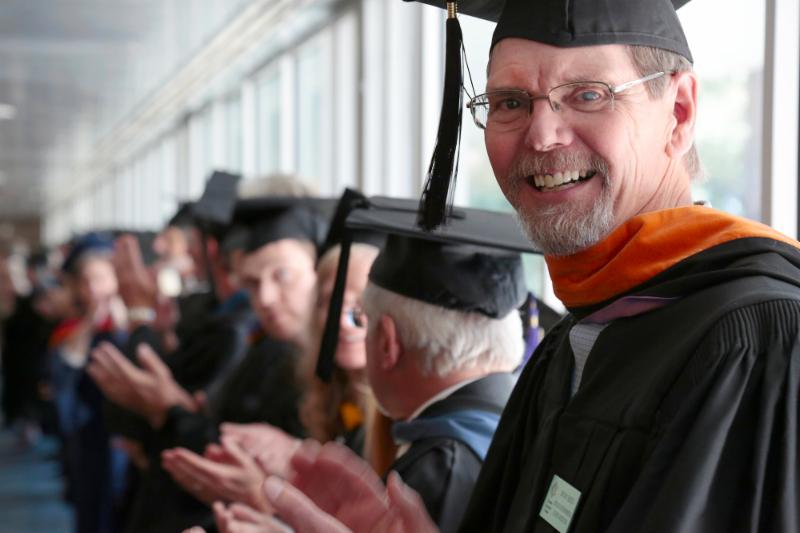
Science Professor Bryan Bates congratulates new graduates during the 2016 Commencement at Coconino Community College. Courtesy photo
FLAGSTAFF — After nearly 25 years of service to student success, Science Professor Bryan Bates received emeritus status at Coconino Community College.
Bates was honored with a plaque during the May 27 meeting of the CCC District Governing Board. The Board voted unanimously to bestow the honor of Professor Emeritus to Bates.
“Professor Bates contributed greatly to the College with his commitment to excellence in teaching and learning, his innovation in the classroom and his research,” said CCC President Colleen Smith. “We will miss him and wish him well on his continued research and new adventures.”
Emeritus status is conferred to outgoing full-time faculty and administrators who have established a record of distinguished service and other forms of professional achievement.
In a nominating letter, longtime CCC faculty member Alan Petersen stated, “During his tenure at Coconino Community College, Bryan has served tirelessly. He has been an admirable instructor who has maintained the highest standards and always asked the best of his students … Bryan Bates always puts students first.”
Petersen went on to say that Bates also served as a dedicated faculty leader outside of the classroom and admirably represented the College in a variety of roles in Flagstaff community organizations, including serving on the boards of the Festival of Science and the Flagstaff Symphony Orchestra.
Another faculty emeritus from CCC, Dr. Bruce Belman, Ph.D., stated in a letter, “What Bryan brings to the classroom is a sense of empowerment to his students. He asks that they become engaged in the subject matter and provides ample opportunities for them to do so.”
Bates became involved with CCC when he collected signatures to enable the college to become a reality. He also taught his first class on the first day the college was open in 1991. He became a full-time faculty member in 1994. He taught biology, archeoastronomy and helped in developing curricula for Environmental Biology and Colorado Plateau Studies.
“If I were asked whether I would do it again – absolutely,” Bates said. “CCC has become one of the top-ranked community colleges in Arizona if not the US because of the dedication of the administration, staff and faculty.”
Bates added: “It has been an incredible journey to be a part of CCC, and I am deeply honored to be named Professor Emeritus.”
CCC has granted emeritus status to only seven other people in its 25-year history, which includes three presidents, one vice president, a board member and two faculty members.
About Coconino Community College: Student success is the heart and purpose of Coconino Community College. CCC provides affordable tuition and a wide variety of certificates and degrees including career/technical programs with nearly 50 certificate programs and two-year associate degrees in various fields including nursing, fire science, law enforcement and business. The award-winning CCC2NAU program provides an innovative way to smooth a student’s path toward a bachelor’s degree at Northern Arizona University with tailored advisement and institutional collaboration, including access to amenities at NAU.
Since 1991, CCC has served residents across 18,000 square miles of Coconino County. CCC has helped create the region’s skilled workforce, which is improving overall health, safety and the economy in the region. Today, CCC serves more than 7,500 students per year with two campuses in Flagstaff.
CCC reaches out to the more rural portions of the County including Williams, the Grand Canyon/Tusayan, Page/Lake Powell, Fredonia, Tuba City and other remote areas on the Navajo, Hopi and Supai Tribal Lands. Instructional sites offer classes through online, in-person and Interactive Television classes to meet the needs of students in these rural and remote areas. Nearly 25 percent of CCC’s students are Native American learners.
